Idiomaticity and Formulaicity in Written Discourse in Portuguese Produced by Mozambique University Students
DOI:
https://doi.org/10.11606/issn.2236-4242.v31i1p145-170Keywords:
Fluency and proficiency, rhetorical structure, idiomaticity, worldview, discourse competence.Abstract
The observation of texts written in Portuguese by Mozambican university students reveals writing difficulties that goes beyond the realm of knowledge of grammatical rules. The mother tongues of most of these students are of Bantu origin and used mainly in restricted or familiar contexts. Unlike Bantu languages, Portuguese, the second language to most of these students, enjoys the status of official language, of teaching, of public administration, of contact with the world, being the language, which confers social prestige in Mozambique. This framework fosters linguistic, discursive, rhetorical, cultural and idiomatic transfers that manifest themselves in a variety of forms of expression peculiar to the languages and cultures in contact, in oral or written communication, and for the present study, emphatically in writing. In this article, we explore the extent to which these students develop fluency and proficiency in the target language through the way they organize linguistic and discursive units to express their world view in the interlingual and intercultural context in which they live. Thus, we selected pieces of discourse from 4 compositions written by them and focus the analysis on how they accommodate aspects of idiomaticity and formulaicity in texts of the opinion genre and within argumentative typology.Downloads
Downloads
Published
Issue
Section
License
The Editorial Board authorizes free access to and distribution of published contentes, provided that the source is cited, that is, granding credit to the authors and Linha D'Água and preserving the full text. The author is allowed to place the final version (postprint / editor’s PDF) in an institutional/thematic repositor or personal page (site, blog), immediately after publication, provided that it is available for open access and comes without any embargo period. Full reference should be made to the first publication in Linha D'Água. Access to the paper should at least be aligned with the access the journal offers.
As a legal entity, the University of São Paulo at Ribeirão Preto School of Philosophy, Sciences and Languages owns and holds the copyright deriving from the publication. To use the papers, Paidéia adopts the Creative Commons Licence, CC BY-NC non-commercial attribution. This licence permits access, download, print, share, reuse and distribution of papers, provided that this is for non-commercial use and that the source is cited, giving due authorship credit to Linha D'Água. In these cases, neither authors nor editors need any permission.
Partial reproduction of other publications
Citations of more than 500 words, reproductions of one or more figures, tables or other illustrions should be accompanied by written permission from the copyright owner of the original work with a view to reproduction in Linha D'Água. This permission has to be addressed to the author of the submitted manuscript. Secondarily obtained rights will not be transferred under any circumstance.










